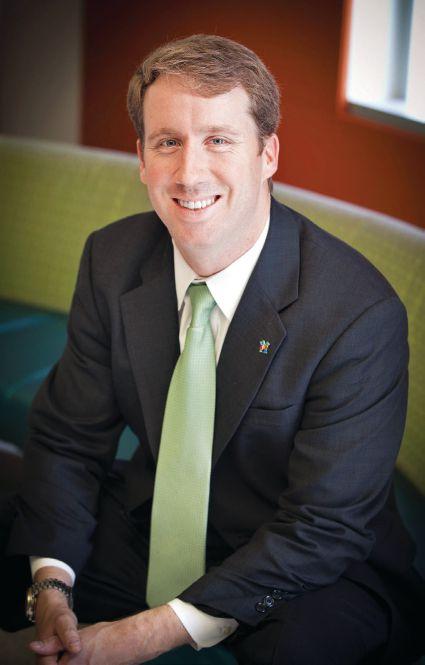
4 minute read
Rollins joins with Teach for America to promote health in the classroom
program was formed, and enrollment grew. And he brought many of the current faculty on board, including Dana Flanders, Harland Austin, David Kleinbaum, Michelle Marcus, Carrie Drews-Botsch, and Carol Hogue, who holds the Jules and Uldeen Terry Chair in Maternal and Child Health, the first endowed professorship at Rollins.
“John was the person who made me feel comfortable as a new faculty member,” says Kleinbaum, who dedicated the second edition of his textbook, Logistic Regression: A Self-Learning Text, to his colleague and mentor.
In 2002, Boring stepped down as chair to teach full time at Rollins and in the School of Medicine, where he introduced “Analytic Medicine,” a required course for first-year medical students, several years earlier. He also
John McGowan, professor of epidemiology and director of the MD/ MPH program at Rollins, codirects the MSCR program with Boring. “He convinced me to work with Dr. Stephens to set up the program,” says McGowan. “John can convince you to do anything—he is such a good coach and cheerleader.”
Students also share that sentiment. Medical students selected Boring as Teacher of the Year five times. He received the Thomas F. Sellers Jr. M.D. Award (1993), which honors a Rollins faculty member deemed as a role model by colleagues, and the Thomas Jefferson Award (1995), Emory’s highest faculty honor.
Although Boring is officially retired, he will continue doing what he loves best: teaching students.
“When I came here, it was the right time and the right place,” he says. “I was advised and carried along by some wonderful people who are responsible for what Rollins is today. Every day I’ve spent at Emory has been more than satisfactory for me.”—Pam Auchmutey
“They’re big! If only they fit,” jokes Carrie Oliver of her “Teacher Pants”— metaphorical trousers that represent the self-reflection, patience, and vision required to teach PreK-12 students about health.
Last spring, Oliver was among the first Rollins students enrolled in Classroom to Community, a seminar that paired them with Teach for America (TFA) teachers in Atlanta-area schools. The seminar is part of ConnectEd4Health, an alliance between Rollins and TFA to promote health in the classroom to overcome barriers to education. The collaboration is the first of its kind between a school of public health and TFA, the national program that places outstanding college graduates in underserved areas to teach for two years.
“Our partnership with TFA is a launch pad for using local schools as a vehicle to teach critical health skills to the next generation,” says Ariela Freedman, assistant research professor at Rollins and a TFA alumna.
ConnectEd4Health grew out of student interest fostered by Freedman. Although it offered no course credit, the first seminar drew in a landslide of applicants. Freedman chose 15 students who were paired with TFA mentors to learn to guide them in becoming effective health educators.
As RSPH students quickly learned, the classroom can be an unforgiving place. “It’s a reality check from Rollins, where everyone tells you to change the world. Then you’re out in the world, and it’s big,” says Gaëlle Gourmelon 12MPH.
But the difficulties were part of the learning process for Lolly Beck-Pancer 13MPH. Her first lesson on high levels of sugar in food might have been ambitious for a kindergarten class, but she made an impression—one 5-year-old was so taken aback by the presence of sugar in his chocolate milk that he flatly refused the beverage in favor of water.
Throughout spring semester, Rollins students and TFA members discussed how to better promote health in the classroom. In an entry on the Classroom to Community blog, Sahar Salek 12MPH discussed her volunteer work as a dental assistant at a school-based health center in south San Diego. Such centers, she wrote, can be crucial to combating the social determinants of health in underserved schools and integrating health and education.
Audra Williams, an MD/MPH student at Emory and a TFA alumna from Atlanta, concurs. “This year brought together my lives as a teacher and medical student,” says Williams, who co-taught the Classroom to Community seminar with Freedman. “We all need to take on the responsibility to learn what’s going on in our schools to build healthier communities.”

Williams also took part in a project to launch a database that TFA teachers can use to develop lesson plans on nutrition, mental health, reproductive health, and other topics.
“Classroom to Community has deepened our teachers’ understanding of how health affects the lives of their students,” says Lauren Lamont, TFA manager of teacher leadership and development. “They leave the program with a better understanding of how to be agents for change.”
Early last May, Erika Rees, an MPH candidate in environmental health, and Scot Seitz, a TFA earth science teacher at Ivy Prep Academy, an all-girls charter school in Gwinnett County, handed out gloves and goggles to Seitz’s sixth-grade class. They were about to observe the effect of weak sulfuric acid on common building materials such as zinc and brick, part of a lesson on acid rain designed by Rees. The lesson proved to be a popular one with students, who were reluctant to remove their goggles when it ended.
Seitz and Rees worked in tandem to make their health lessons more engaging. “After each class, we shared some thoughts and tried new things during the next class,” Seitz wrote in his journal about the experience. “As each class went by, the lessons got better and better.”
By semester’s end, Classroom to Community had helped TFA teachers understand how health affects individuals and communities, Rollins students become better educators, and PreK-12 students develop skills necessary to live a healthy life.
“It’s not just about how to develop lessons plans,” says Rollins student Lolly Beck-Pancer. “It’s about how to create social justice wherever we go.”—Stone Irvin








